10 Foods That Help Reduce Anxiety and Depression
Feed friendlier feelings with the right foods.

Westend 61/Getty Imagse
When you’ve got deadlines to meet and errands to run, navigating anxiety and depression can feel like just another task that’s impossible to tackle. This is especially true when you need to pencil in supportive activities like therapy sessions, exercise classes or daily walks, and phone calls to connect with loved ones. But managing your mental health doesn’t start and stop at the “big” things on your to-do list; your smaller, daily behaviors, like eating meals and snacks, can make a difference in your mood.
Meet the Experts
Uma Naidoo, MD, is a nutritional psychiatrist, chef, and the author of This Is Your Brain on Food and Calm Your Mind with Food,
Nick Bach is the CEO of Grace Psychological Services.
Lauren Mahesri, RDN, LD, is a registered dietitian nutritionist who specializes in family nutrition.
Why Food Is Key to Managing Mood
It might not seem obvious, but the foods you eat can significantly contribute to your mental health and stress levels. More specifically, some foods can help reduce symptoms of anxiety and depression, particularly those high in compounds that fight oxidative stress and inflammation—two mechanisms behind mental health issues. (In fact, on the flip side, some of the worst foods for anxiety are those high in inflammatory ingredients.) Similarly, foods rich in gut-friendly nutrients (like probiotics and fiber) can support your mood, as the gut microbiome and brain are so closely related.
Of course, no single food can magically cure anxiety and depression, and food alone isn’t a replacement for treatments like medication or therapy. (It’s also very important not to wait to chat with your doctor if you think you’re experiencing mental health symptoms.)
Foods to Reduce Anxiety and Depression
If you’re looking for a more well-rounded approach to taking care of your mental health, it’s worth focusing on incorporating lots of these foods that help reduce anxiety and depression severity and prevalence.
Fatty Fish
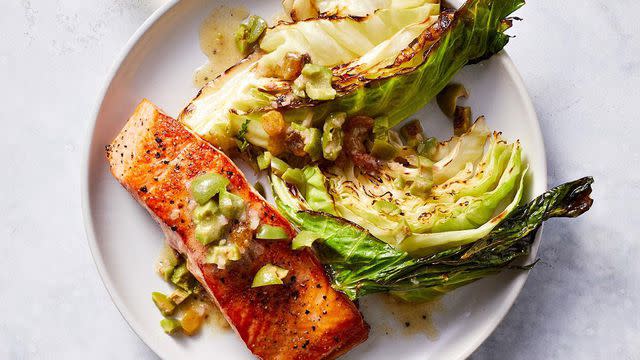
According to Uma Naidoo, MD, a nutritional psychiatrist, regularly noshing on fatty fish (such as salmon and tuna) can support healthy brain tissue and mental wellbeing, potentially reducing anxiety and depression. They’re packed with omega-3 fats—specifically, eicosapentaenoic acid (EPA) and docosahexaenoic acid (DHA)—which are highly beneficial for the brain, Naidoo says. Both fats work by protecting the brain from oxidative stress and inflammation, which are “linked to mood disorders like anxiety and depression, as well as neurodegeneration [i.e, the death of nerve cells] that can influence memory loss, brain fog, and cognitive decline,” Naidoo explains.
Not a fan of fish? According to Naidoo, omega-3 fats are also found in plant foods like walnuts and chia seeds. They aren’t absorbed quite as well as the fats in seafood, but they’re a solid alternative with healthy brain benefits nonetheless.
Fermented Foods

Victor Protasio
By now, you’ve probably heard all about the benefits of fermented foods for the gut. But they might also boost your mood, thanks to the link between the gut health and brain health. According to Naidoo, fermented foods like plain yogurt, kimchi, and tempeh contain live bacterial cultures called probiotics. As Naidoo explains, these bacteria “replenish the population of good bacteria in the gut, which helps to balance [the] microbiome.” The result is lower inflammation and improved production of neurotransmitters, or chemical messengers that control mood and cognition, Naidoo adds.
Leafy Greens

Leafy greens like spinach, kale, and Swiss chard are some of the best foods for brain health, and no wonder: They’re brimming with nutrients that contribute to a healthy mood. Noteworthy examples include polyphenols, vitamin E, and vitamin C, all of which have antioxidant and anti-inflammatory properties—which, again, can help pump the brakes on mental health symptoms. What’s more, vitamin C helps clear the body of excess cortisol, also known as the “stress hormone.” This can further ease feelings of stress and anxiety, according to Naidoo.
Berries
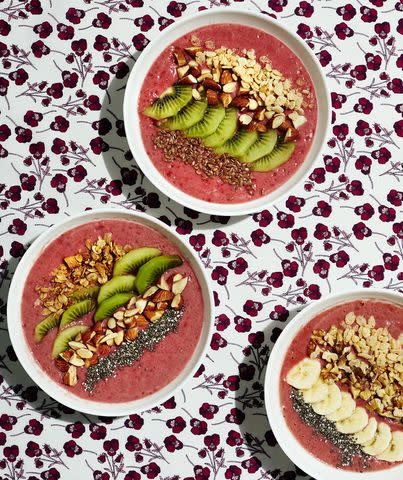
One more time for the folks in the back: A healthy gut equals a healthy brain! So many gut-friendly foods—like those high in fiber—are also great for your noggin. Berries, such as strawberries, blueberries, and raspberries, are prime examples. These richly colored fruits are packed with fiber, a nutrient that aids microbial balance in the gut. This paves the way for a better stress response, improved regulation of neurotransmitters (including serotonin), and lower levels of inflammation and oxidative stress, all of which can ease anxiety and depression.
Plus, berries are teeming with powerful antioxidants called anthocyanins, according to Naidoo. These compounds, which are also natural pigments that give berries their iconic red-purple-blue hue, support a healthy mood by regulating inflammation, controlling signals between neurons, and balancing the gut.
Oysters
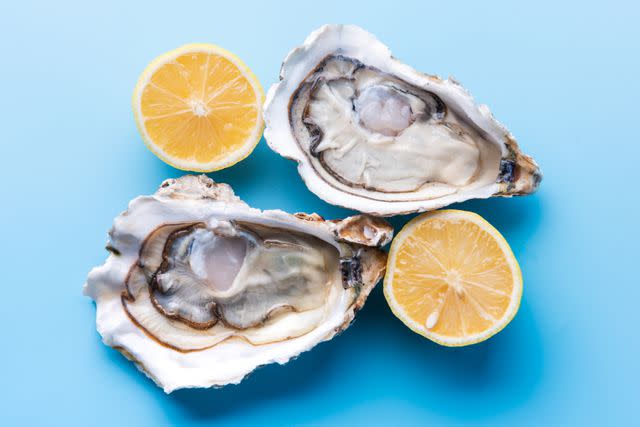
HUIZENG HU/Getty Images
Shellfish lovers, this one’s for you. Oysters are another great food for anxiety and depression—all thanks to their sky-high content of zinc, an essential mineral. “Zinc regulates levels of the neurotransmitters gamma-aminobutyric acid (GABA) and serotonin, both of which are crucial for mood and stress regulation,” Naidoo says. For context, adults need about 11 milligrams of zinc per day, and one average-sized oyster contains approximately 5 milligrams, Naidoo says. That means eating just two or three oysters per day will help you get enough zinc. But if oysters aren’t your thing, you can also get zinc from “other shellfish like crabs or lobsters, as well as legumes, nuts, and beef,” Naidoo says.
Related: GET THE RECIPE
Dark Chocolate

Dark chocolate is another food that can boost your mood, and not just because it tastes so good. This treat is loaded with antioxidant polyphenols, which have been shown to support brain function by controlling neuroinflammation and increasing neurogenesis (aka, the production of new neurons). Dark chocolate also has a prebiotic effect on the gut, meaning it feeds good gut bacteria, ultimately aiding mental wellness via the gut-brain relationship. To top it off, dark chocolate is a source of magnesium, “a nutrient that helps calm the central nervous system [and reduce] anxiety,” says Naidoo.
Nuts and Seeds
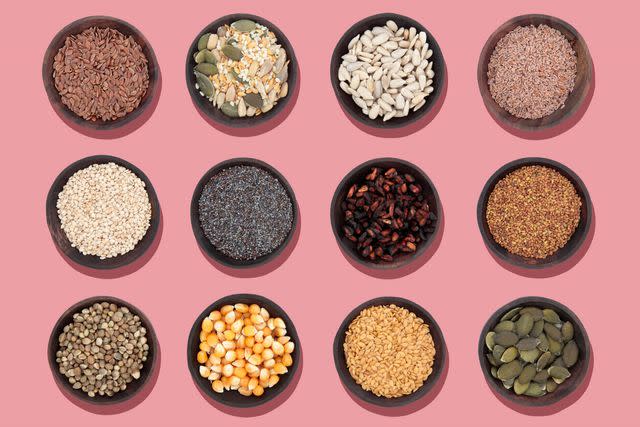
Magnesium regulates neurotransmitters in the brain that are critical for calming you down. Magnesium is known for promoting relaxation. "Nuts and seeds contain magnesium, which has been linked to reduced anxiety symptoms," says Nick Bach, CEO of Grace Psychological Services. "A client once shared that incorporating these foods into her diet significantly improved her mood and anxiety levels over several months."
Non-Refined Grains

"Non-refined grains, such as whole wheat or multigrain bread, brown rice, barley, quinoa, bran cereal, and oatmeal, have been linked to lower depression and anxiety severity," says Lauren Mahesri, RDN, LD, a registered dietitian nutritionist. "This is likely because of the positive effects non-refined grains have on the microbiome, and the rich diversity of vitamins and minerals that support brain health."
These grains are easy to consume. You can make everything from hearty sandwiches to fulfilling rice or quinoa bowls. You can even kick off your morning with oatmeal to start the day with a meal for a positive mindset.
High-Fiber Vegetables
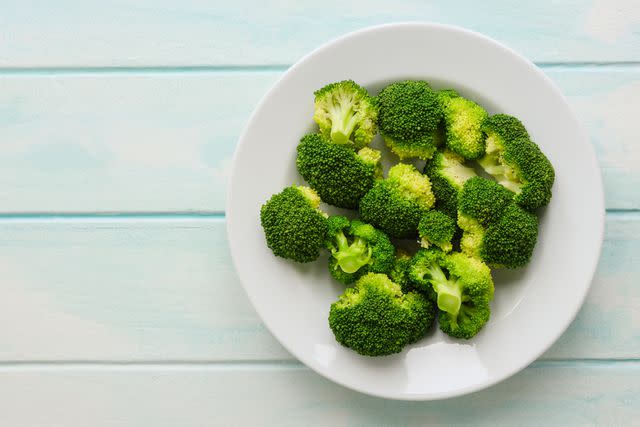
enviromantic/Getty Images
They say it's important to get your veggies. And it's not just because they're good for your physical health. High-fiber vegetables also have a positive impact on your mental health. "High-fiber vegetables like broccoli, cauliflower, and carrots have also been shown to decrease the severity of depression and anxiety," says Mahesri. "These vegetables are high in fiber and antioxidants. Antioxidants neutralize free radicals and may help reduce oxidative stress, which is often elevated in individuals with depression."
Olive Oil
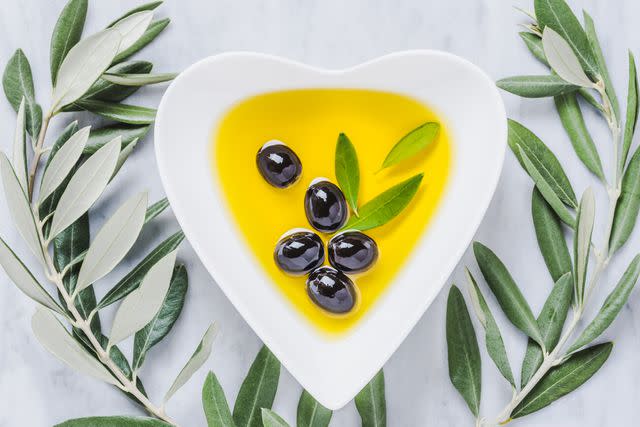
Leo Nori/Getty Images
"Olive oil has been shown to reduce depressive symptoms due to it's high omega-3 content," says Mahesri. "These healthy fatty acids have a critical role in brain health and have beneficial effects on neurological function."
Olive oil is an easy food to incorporate into your diet. You can cook just about anything with it, or you can use it on your salads (typically with vinegar) or drizzle it on a slice of toast with tomato paste. Olive oil is a versatile ingredient that's also commonly used in dips like hummus and pesto.
For more Real Simple news, make sure to sign up for our newsletter!
Read the original article on Real Simple.


